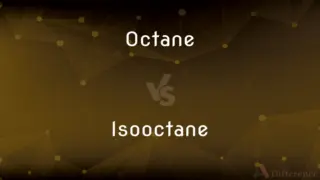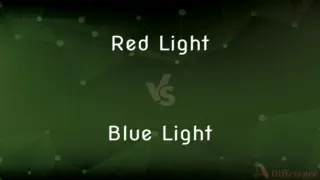Villa vs. Chateau — What's the Difference?
Edited by Tayyaba Rehman — By Urooj Arif — Updated on May 13, 2024
Villa is typically a luxurious country house in Roman contexts, whereas a chateau refers to a large French country house or castle.

Difference Between Villa and Chateau
Table of Contents
ADVERTISEMENT
Key Differences
Villas originated in ancient Rome as upper-class country homes, often luxurious and used for retreats from city life. In contrast, chateaux are French and were historically large manor houses or castles, frequently associated with nobility and sprawling estates.
Villas are generally found in warmer Mediterranean climates, showcasing classical architecture with gardens and courtyards. Meanwhile, chateaux are prominent in France's diverse landscapes, from vineyard settings to the heart of historic regions, and feature distinct French architectural elements like turrets and moats.
Villas are often single-story structures, emphasizing leisure and comfort with spacious living areas and private gardens. On the other hand, chateaux can be quite large and opulent, often multi-storied with significant historical and cultural importance.
While villas typically serve as residential or holiday homes, chateaux might also function as wineries, museums, or hotels, capitalizing on their historic and aesthetic appeal. The appeal of villas lies in their intimate, luxurious settings ideal for relaxation and privacy, whereas chateaux often draw attention for their grandeur, historical significance, and architectural majesty.
Comparison Chart
Origin
Ancient Rome
Medieval France
ADVERTISEMENT
Primary Use
Luxury retreats
Noble residences
Climate Association
Mediterranean
Varied, often temperate
Architectural Style
Classical, single-story
French, often multi-storied
Current Functions
Residences, holiday homes
Museums, hotels, wineries
Compare with Definitions
Villa
A country residence or estate.
They rented a villa in Tuscany for the summer holidays.
Chateau
A large French country house or castle.
The chateau stood majestically on the hill overlooking the vineyard.
Villa
British historical term for a self-contained suburban house.
Victorian villas are known for their distinctive architecture.
Chateau
Used in names of hotels and restaurants modeled after French chateaux.
Chateau Marmont is a famous Hollywood landmark.
Villa
In Roman antiquity, a country house built for the elite.
Ancient ruins near the city revealed a Roman villa.
Chateau
Architectural style involving elements typical of French chateaux.
The new library was built in a chateau style.
Villa
Any various luxurious residential dwellings.
The millionaire owned a seaside villa.
Chateau
An estate where wine is produced and stored.
They visited a chateau known for its exquisite Bordeaux.
Villa
A villa is a type of house that was originally an ancient Roman upper-class country house. Since its origins in the Roman villa, the idea and function of a villa has evolved considerably.
Chateau
A manor house or residence of the lord of the manor.
The local chateau hosts historical tours.
Villa
(especially in continental Europe) a large and luxurious country house in its own grounds.
Chateau
A large French country house or castle, often giving its name to wine made in its neighbourhood
Château Margaux
Villa
A large country house of Roman times, having an estate and consisting of farm and residential buildings arranged around a courtyard.
Chateau
A castle or manor house in a French-speaking region.
Villa
The often large, luxurious country house of a well-to-do person.
Chateau
An estate where wine is produced and often bottled, especially in the Bordeaux region of France.
Villa
A country estate with a substantial house.
Chateau
A large country house.
Villa
Chiefly British A house in a middle-class suburb.
Chateau
Alternative spelling of château
Villa
(plural "villas") A house, often larger and more expensive than average, in the countryside or on the coast, often used as a retreat.
Chateau
A castle or a fortress in France.
Villa
A family house, often semi-detached, in a middle class street.
Chateau
A manor house or residence of the lord of the manor; a gentleman's country seat; also, particularly, a royal residence; as, the chateau of the Louvre; the chateau of the Luxembourg.
Villa
A country house, with farm buildings around a courtyard.
Chateau
An impressive country house (or castle) in France
Villa
A country seat; a country or suburban residence of some pretensions to elegance.
Villa
Mexican revolutionary leader (1877-1923)
Villa
Detached or semi-detached suburban house
Villa
Country house in ancient Rome consisting of residential quarters and farm buildings around a courtyard
Villa
Pretentious and luxurious country residence with extensive grounds
Villa
A detached or semi-detached urban residence with yard and garden space.
Their new villa features a sprawling backyard.
Common Curiosities
What is the typical architectural style of a villa?
Villas are often built in a classical style with spacious layouts and private gardens.
Can villas be used for purposes other than residential?
While primarily residential, villas can also serve as boutique hotels or event locations.
Are chateaux found outside of France?
Yes, but they are primarily a French phenomenon reflecting France’s cultural and historical heritage.
What kind of amenities might one find in a villa?
Villas typically include luxury amenities such as private pools, extensive gardens, and outdoor entertainment areas.
Are chateaux ever privately owned?
While many are public or commercial properties, private ownership of chateaux is still common.
What makes a chateau different from a castle?
While both can be fortified, a chateau is often more luxurious and integrated into a noble estate.
Are there modern villas?
Yes, modern villas continue to be built, especially in luxury real estate markets, reflecting contemporary architectural styles.
Is it common for chateaux to be open to the public?
Many chateaux are open for public tours, especially those that are historical sites or wineries.
How do the locations of villas and chateaux differ?
Villas are usually situated in scenic, often coastal areas designed for privacy and relaxation, while chateaux are often in rural, historically significant areas.
What is the historical significance of villas and chateaux?
Villas were a symbol of social status in Roman times, while chateaux represent feudal and noble power in French history.
Share Your Discovery

Previous Comparison
Octane vs. Isooctane
Next Comparison
Doormat vs. PushoverAuthor Spotlight
Written by
Urooj ArifUrooj is a skilled content writer at Ask Difference, known for her exceptional ability to simplify complex topics into engaging and informative content. With a passion for research and a flair for clear, concise writing, she consistently delivers articles that resonate with our diverse audience.
Edited by
Tayyaba RehmanTayyaba Rehman is a distinguished writer, currently serving as a primary contributor to askdifference.com. As a researcher in semantics and etymology, Tayyaba's passion for the complexity of languages and their distinctions has found a perfect home on the platform. Tayyaba delves into the intricacies of language, distinguishing between commonly confused words and phrases, thereby providing clarity for readers worldwide.














































